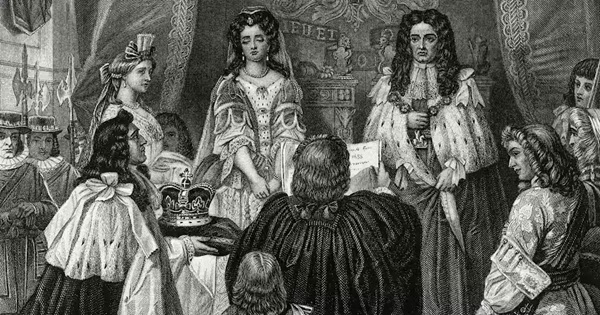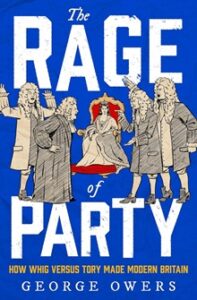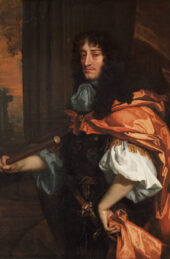Whig vs Tory
During the pulsating and action-packed months of 1712, 1713 and 1714 many people, including a hefty chunk of MPs, were convinced that the country teetered on the edge either of the imposition of an absolutist Roman Catholic King and the extirpation of the liberties of the subject, or of a civil war, or possibly both. In this fevered atmosphere, there were endless rumours of treason at the very highest level, with many convinced that the country was being betrayed to the French by Britain’s own government.
These suspicions spilled over into actual violence. The newly appointed ambassador to France was killed in a duel which many saw as effectively a premediated political assassination. Robert Harley, the Queen’s Lord Treasurer (effectively Prime Minister) was almost assassinated by a booby-trapped band-box sent through the post. Gangs of ferocious and politically motivated aristocratic hooligans called ‘Mohocks’ were said to prowl the streets of London looking for minsters of the crown to murder.
It is unlikely that you will be aware of this, because this period – from roughly the Glorious Revolution of 1688 through to the accession of a new German royal dynasty in the form of fat turnip-loving Hanoverian George I in 1714 – is clouded in obscurity like no other period of modern British history. You might just about have heard of the Glorious Revolution – when Roman Catholic King James II lost his crown and was replaced by Dutchman William III – and perhaps Queen Anne (or at least Olivia Colman’s on-screen depiction of her in hit film The Favourite), but you’d be unusual if you had any inkling of the political crisis caused by the negotiations that led to the Peace of Utrecht and the crisis of the Protestant succession that followed it.
Well, fret no more, because my new book, The Rage of Party: How Whig Versus Tory Made Modern Britain, tells this extraordinary story in all its delicious and rambunctious glory. It examines how, after the Glorious Revolution, much of the unfinished business of not only 1688 but also the entire 17th century was finally resolved (more or less) through a narrative laced with sexual immorality, extraordinary high-political drama, multiple assassination plots, and a not inconsiderable number of riotous fights on election day involving medieval weaponry.
I show how the Tories – initially at least the ‘Church and King’ party – and the Whigs – sceptics of divine right monarchy and defenders of the religious rights of Protestant ‘Dissenters’– fought a vicious fight over the course of 35 pulsating years to decide the fate of the country. Would Britain remain a cohesive, insular and largely unchanged country defined by the authority of parson and squire, or would it embrace a new world of war, financial innovation and cosmopolitan involvement in the affairs of Europe? Whereas the Tories fought a long rear-guard battle against new and (to them) frightening developments which affected the Church of England’s religious monopoly and the customary social order, the Whigs, keen to ensure that James II’s Catholic son and his supporters (the Jacobites) had no chance of recovering the throne, embarked on major changes.
To pay for the war needed to defeat the Jacobites’ great ally – Louis XIV’s France – the Whigs established the Bank of England and the national debt came into being. They revolutionised the ramshackle British state, expanding and modernising it to fight a colossal land war the likes of which had not been seen for centuries. They supported and fundamentally shaped the establishment of the Union between England and Scotland, which was largely designed to protect English security against Scottish Jacobitism.
This political battle – which was a class conflict, a culture war and an electoral struggle all rolled into one – shaped Britain fundamentally. Without it, Britain’s rise to imperial top dog, her growing economic power, and her unusual level of political stability would not have happened (for good or ill). It’s a story that echoes through our modern history right through to today’s political and cultural antagonisms.
However, I hope that, as well as the big picture and momentous seismic plates of our political history, my book captures the dynamic and highly coloured world of rakes, schemers, rioters and presuming parsons who form the cast of characters, as they plotted, argued, supped, shagged and stabbed their way through an epic narrative that takes the reader from the Queen’s bedchamber to the brothels of London, from the chaotic benches of the House of Commons to the smoky and scandalous coffeehouses of Westminster.
The Rage of Party: How Whig Versus Tory Made Modern Britain by George Owers is out now, published by Constable.







